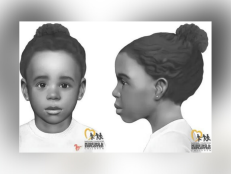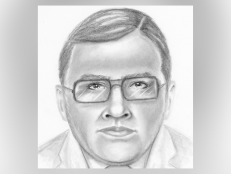Pandemic Gives Detectives Opportunity to Work Cold Cases, Apply DNA Profiling
Efforts are being made during the COVID-19 pandemic to exhume and identify homicide victims using DNA profiling in order to bring closure, and perhaps justice, for family members.

Left, a Forensic Analyst prepares DNA samples [Photo: Mario Villafuerte/Getty] and a sketch of the unidentified homicide victim Jane Hudsonville Doe [NCMEC]
For the first time this week the victim from a 53-year-old cold homicide case in Hudsonville, MI will be exhumed from her grave. The goal is to extract DNA, enter it into a database and hopefully lead authorities to a possible family member. The case involving this Jane Doe, dubbed "Jenny" by detectives, has been lingering since October 1967. According to the Ottawa County Sheriff's Office, hunters discovered the nude body of the unidentified black woman near 52nd Avenue and Fillmore Street in Blendon Township.
Reports say "Jenny" was likely in the area for 3 - 7 days after she was killed and her official cause of death is listed as a homicide. Detectives believe she was strangled and suffered blunt force trauma to her head.
The FBI, Detroit Police, Michigan State Police and others have been involved over the years, but it wasn't until the pandemic hit when detectives received their biggest break for this case... time.
ABC 13 reports the cold case team wasn't able to hit the streets to conduct too many interviews in person because of the health crisis, so they devoted their time to research. This is one of the cases they've been tackling.
"That slowdown during COVID for support units was very useful for this case... to be able to research this case and the circumstances surrounding potential exhuming," Capt. Mark Bennett with the Ottawa County Sheriff's Office said.
Bennett says the female was a victim of a "real heinous crime." "Jenny's" information was also submitted in 2018 to NamUS, a non-profit working to identify victims in homicide and other cases. It's the official clearinghouse for missing, unidentified and unclaimed persons.
The National Center for Missing and Exploited Children is also assisting with the case. Reports say the organization is providing resources, including forensic anthropology.
Another Team in Massachussetts Works To Solve a Cold Case
Nearly 871 miles away in New Bedford, Mass. another family is hoping for justice. Detectives there say they are also using extra time during the COVID-19 pandemic to solve a 45-year-old cold case. Reports say 21-year-old Joaquim “Jack” Perry's body was found behind the New Bedford airport. He'd been badly beaten.
Perry was a married father of one, with another baby on the way. He was last seen alive on October 4, 1975 and his body was found 15 days later by a teenager, the report adds. The original detective, Sgt. Edmund F. Craig, was interviewed by The Standard-Times in 1979, and stated that the suspect who killed Perry likely used a club or baseball bat and Perry's skull was cracked in three places. The report says robbery doesn't appear to have been the motive because Perry was found still wearing a ring worth more than $50.
Adelina Perry, the victim's sister, told the publication recently, "To this day I think about him every day. My heart’s broken, I just want to know what happened and why.” The local District Attorney's Office confirms their team is reviewing every unsolved homicide case over the last 40+ years to see what leads can be developed with new technology, the report adds.
Jane Doe Clues
As for the Jane Doe case in Michigan, investigators believe "Jenny" is between the ages of 16 - 21-years-old. She weighed 100 pounds and stood around 5 feet 7 inches tall. NCMEC says there were scars on her entire body and no dental work was observed, but she did have an extra tooth growing in behind one of her top middle teeth. This would have been noticed if she held her head back, they add. Because of some of the other observations with her dental health, including decaying in other teeth, authorities believe she had minimal dental care.
When "Jenny" was located she was wearing, "gold denim colored long pants, overtop a pair of pink cotton pants," NCMEC adds. The pink pants were too big and police say someone may have tried to sew the seam on at least one of the legs to help make them fit around the waist. The female was also found wearing a homemade sanitary napkin made of cloth, denim cord, and newspaper," NCMEC adds.
If you know anything about "Jenny" or the area near Grand Valley State University where she was found, please contact: 877-88-SILENT.
If you have any leads on the case involving Joaquim Perry, please call: 855-MA-SOLVE (855-627-6583).
Read more: ABC13, NamUS, The Herald News

























































